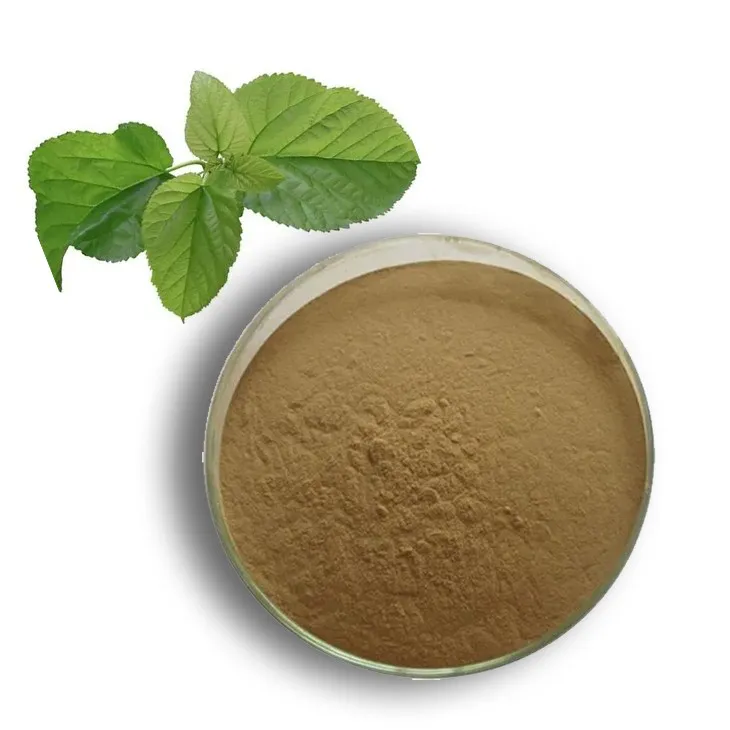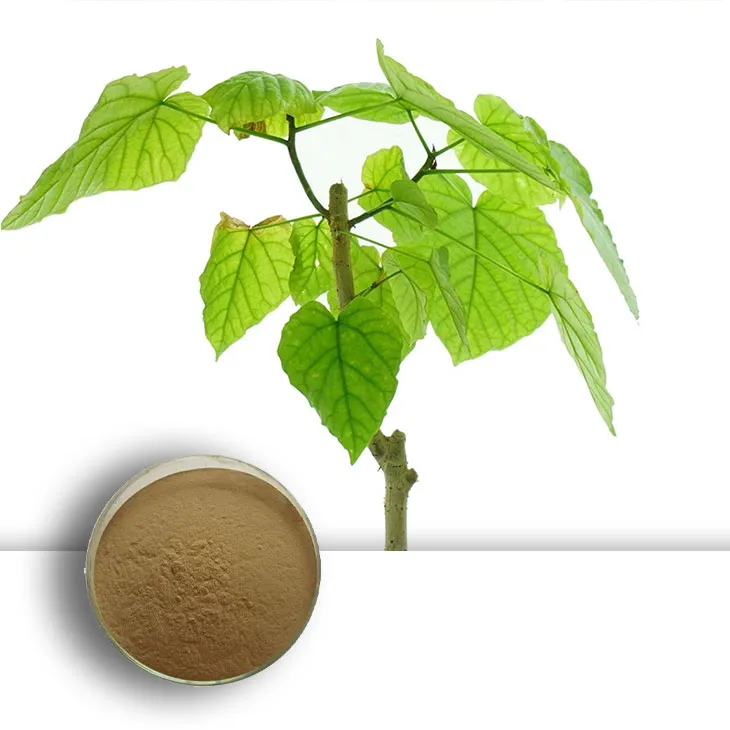- 0086-571-85302990
- sales@greenskybio.com
Use mulberry leaf extract to prevent diseases and enhance immunity.
2024-11-12

1. Introduction to Mulberry leaf Extract
Mulberry leaves have been used in traditional medicine for centuries in various cultures. The extract of mulberry leaves is rich in a variety of bioactive compounds, which make it a promising natural product for health promotion.
Bioactive Compounds in Mulberry leaf Extract: Mulberry leaf Extract contains flavonoids, alkaloids, and polysaccharides, among other substances. Flavonoids, such as rutin and Quercetin, are well - known for their antioxidant properties. Alkaloids, like 1 - deoxynojirimycin (DNJ), have unique physiological effects. These bioactive compounds work together to contribute to the potential health benefits of mulberry leaf extract.

2. Traditional Uses of Mulberry Leaves
In traditional Chinese medicine, mulberry leaves have been used to treat various ailments.
2.1. Respiratory Disorders
They were often used to relieve coughs, sore throats, and other respiratory symptoms. The traditional belief was that mulberry leaves could clear heat and moisten the lungs, thus alleviating discomfort in the respiratory system.
2.2. Blood Sugar Regulation
Mulberry leaves were also considered beneficial for blood sugar control. This was related to the presence of compounds like DNJ, which was thought to interfere with carbohydrate digestion and absorption, thereby helping to regulate blood glucose levels.

3. Modern Scientific Research on Mulberry Leaf Extract
With the development of modern scientific research techniques, the potential health benefits of mulberry leaf extract have been further explored.
3.1. Immune - Enhancing Effects
Stimulation of Immune Cells: Studies have shown that mulberry leaf extract can stimulate the activity of immune cells such as macrophages. Macrophages play a crucial role in the immune system as they are responsible for engulfing and destroying foreign invaders like bacteria and viruses. By enhancing the function of macrophages, mulberry leaf extract helps to strengthen the body's first line of defense against diseases.
Antioxidant Activity and Immunity: The antioxidant properties of mulberry leaf extract also contribute to immune enhancement. Oxidative stress can damage immune cells and disrupt the normal functioning of the immune system. The flavonoids in the extract can scavenge free radicals, reducing oxidative stress and thereby protecting immune cells from damage. This allows the immune system to function more effectively.
3.2. Anti - Inflammatory Properties
Inflammation is a common factor in many diseases. Mulberry leaf extract has been found to possess anti - inflammatory properties.
Mechanisms of Anti - Inflammation: The bioactive compounds in the extract can inhibit the production of inflammatory mediators such as cytokines. For example, in vitro studies have shown that certain components of mulberry leaf extract can reduce the release of pro - inflammatory cytokines like interleukin - 6 (IL - 6) and tumor necrosis factor - alpha (TNF - α). By reducing inflammation, mulberry leaf extract may help prevent or treat diseases associated with chronic inflammation, such as arthritis and certain cardiovascular diseases.

4. Mulberry Leaf Extract in Disease Prevention
The properties of mulberry leaf extract make it a potential agent for preventing various diseases.
4.1. Cardiovascular Disease Prevention
Blood Pressure Regulation: Mulberry leaf extract may play a role in regulating blood pressure. Some studies suggest that it can relax blood vessels, which helps to lower blood pressure. This is beneficial for preventing hypertension, a major risk factor for cardiovascular diseases.
Cholesterol - Lowering Effects: It has also been shown to have the potential to lower cholesterol levels. By reducing low - density lipoprotein (LDL) cholesterol and increasing high - density lipoprotein (HDL) cholesterol, mulberry leaf extract can improve lipid profiles and reduce the risk of atherosclerosis, a condition characterized by the build - up of plaque in the arteries.
4.2. Diabetes Prevention
As mentioned earlier, the presence of DNJ in mulberry leaf extract is associated with blood sugar regulation. In the context of diabetes prevention, regular consumption of mulberry leaf extract may help improve insulin sensitivity. This means that the body's cells can respond more effectively to insulin, reducing the risk of developing type 2 diabetes.
Protection of Pancreatic Beta Cells: Additionally, some research indicates that mulberry leaf extract may protect pancreatic beta cells, which are responsible for producing insulin. By protecting these cells from damage, it can further contribute to diabetes prevention.
5. How to Incorporate Mulberry Leaf Extract into Your Diet
There are several ways to include mulberry leaf extract in your daily diet.
- Tea: One of the most common ways is to make mulberry leaf tea. Simply steep dried mulberry leaves in hot water for a few minutes. This not only provides the benefits of the extract but also makes for a refreshing beverage.
- Supplements: Mulberry leaf extract is also available in supplement form. These supplements are convenient for those who want a more concentrated dose of the extract. However, it is important to choose high - quality supplements from reliable sources and follow the recommended dosage instructions.
- Food Additives: In some cases, mulberry leaf extract can be used as a food additive in certain products. For example, it may be added to baked goods or smoothies to enhance their nutritional value.
6. Precautions and Considerations
While mulberry leaf extract offers many potential health benefits, there are also some precautions to keep in mind.
6.1. Allergic Reactions
Some individuals may be allergic to mulberry leaves or components in the extract. Allergic reactions can range from mild skin rashes to more severe respiratory symptoms. If you have a known allergy to mulberries or other related plants, it is advisable to avoid using mulberry leaf extract.
6.2. Interaction with Medications
Mulberry leaf extract may interact with certain medications. For example, if you are taking medications for diabetes or blood pressure, it is important to consult your doctor before using mulberry leaf extract, as it may potentiate or interfere with the effects of these medications.
7. Conclusion
Mulberry leaf extract has a long history of use in traditional medicine and is now being supported by modern scientific research for its potential in enhancing immunity and preventing diseases. Its rich composition of bioactive compounds offers multiple benefits at different levels of the body's physiological functions. However, it is important to use it with caution, taking into account potential allergic reactions and interactions with medications. By understanding the properties and proper use of mulberry leaf extract, we can potentially harness its power to improve our overall health and well - being.
FAQ:
What are the main components in mulberry leaf extract that are beneficial to health?
Mulberry leaf extract contains various beneficial components. One of the key components is flavonoids. Flavonoids have antioxidant properties, which can help neutralize free radicals in the body and reduce oxidative stress. Another important component is alkaloids, which may play a role in regulating physiological functions. Additionally, polysaccharides are also present, and they are thought to contribute to immune - enhancing effects.
How does mulberry leaf extract enhance the immune system?
The immune - enhancing effect of mulberry leaf extract may be achieved through multiple mechanisms. Firstly, its antioxidant components like flavonoids can protect immune cells from oxidative damage, allowing them to function more effectively. Secondly, certain substances in the extract may stimulate the production of cytokines, which are important signaling molecules in the immune response. This can lead to the activation and proliferation of immune cells such as lymphocytes and macrophages, thus strengthening the overall immune function.
Can mulberry leaf extract really prevent diseases?
There is evidence suggesting that mulberry leaf extract may have a role in disease prevention. For example, its antioxidant and anti - inflammatory properties can potentially reduce the risk of chronic diseases such as cardiovascular diseases. By reducing oxidative stress and inflammation, it may help prevent the development of conditions associated with these factors. However, it should be noted that while it shows promise, it is not a substitute for medical treatment and a healthy lifestyle.
Are there any side effects of using mulberry leaf extract?
When used in moderation, mulberry leaf extract is generally considered safe for most people. However, some individuals may experience mild side effects such as gastrointestinal discomfort, including nausea or diarrhea. In addition, those with specific allergies to mulberries or related plants may have an allergic reaction to the extract. It is always advisable to consult a healthcare professional before starting any new supplement.
How should mulberry leaf extract be consumed?
Mulberry leaf extract can be consumed in different forms. It is available as capsules, tablets, or in powdered form. If in powder form, it can be mixed with water, juice, or added to smoothies. The recommended dosage may vary depending on factors such as age, health status, and the specific product. It is important to follow the instructions on the product label or consult a healthcare provider for appropriate dosing.
Related literature
- The Health - Promoting Effects of Mulberry Leaf Extract: A Review"
- "Mulberry Leaf Extract: From Traditional Use to Modern Therapeutic Potential"
- "Immunomodulatory and Disease - Preventive Properties of Mulberry Leaf - Derived Compounds"
- ▶ Hesperidin
- ▶ citrus bioflavonoids
- ▶ plant extract
- ▶ lycopene
- ▶ Diosmin
- ▶ Grape seed extract
- ▶ Sea buckthorn Juice Powder
- ▶ Beetroot powder
- ▶ Hops Extract
- ▶ Artichoke Extract
- ▶ Reishi mushroom extract
- ▶ Astaxanthin
- ▶ Green Tea Extract
- ▶ Curcumin Extract
- ▶ Horse Chestnut Extract
- ▶ Other Problems
- ▶ Boswellia Serrata Extract
- ▶ Resveratrol Extract
- ▶ Marigold Extract
- ▶ Grape Leaf Extract
- ▶ blog3
-
Cranberry Plants and Skin - care Products.
2024-11-12
-
Giant Knotweed Extract
2024-11-12
-
Chia Seed Powder
2024-11-12
-
Fig Extract
2024-11-12
-
Scutellaria Extract
2024-11-12
-
Black Pepper Extract
2024-11-12
-
Curcuma Longa Extract/Turmeric extract
2024-11-12
-
Dandelion Root Extract
2024-11-12
-
Hops Extract
2024-11-12
-
Kupilu Extract
2024-11-12
-
Lycopene
2024-11-12





















